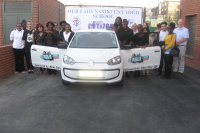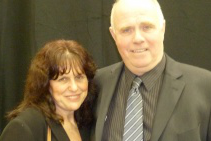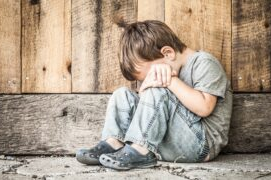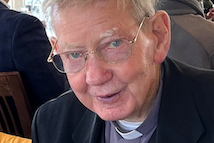Prince Charles attends Peace Service at Westminster Cathedral
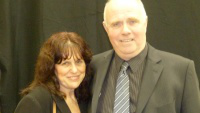
Margaret and Barry Mizen (photo: J Siedlecka)
Archbishop Vincent Nichols, and the parents of murdered teenager Jimmy Mizen made passionate appeals for all people to work together to bring an end to knife and gun crime in London, during a special service at Westminster Cathedral today.
'Building a Legacy of Peace', a service marking the second anniversary of Jimmy's death in a random stabbing in south east London, was held in the presence of the Prince of Wales and led by The Most Reverend Vincent Nichols, Archbishop of Westminster and The Right Reverend and Right Honourable Richard Chartres, Bishop of London.
Before the service, Jimmy's parents Barry and Margaret launched a personal safety film for schools, and appealed for politicians to do more to end street violence.
Mrs Mizen said: "The three party leaders, please all of you work together on this issue. We keep working for peace around the world but we have no peace on our streets. Sometimes I feel it's like it's a war out there on the streets of our beautiful country."
The film, produced by not-for-profit organisation Kids Taskforce in memory of Jimmy, will be distributed to all secondary schools in England and Wales.
Jimmy bled to death the day after his birthday when Jake Fahri, 19, threw a glass tray at him in the Three Cooks bakery in south east London, severing an artery in his neck. Fahri, who lived near the Mizens, was given a life sentence for the murder in 2009. Since the killing, Jimmy's parents have tirelessly campaigned against violent crime and set up the Jimmy Mizen Foundation charity, which runs a number of community initiatives, including two Jimmybuses for scout groups.
Mrs Mizen said before the service: "Obviously the service is for me to remember my son - it was his 18th birthday yesterday. But it is also about everyone else who has been killed. We want this to be an ongoing thing - I don't want any other mothers suffering as I have suffered."
Victims of knife and gun crime whose families were present at the service included: Bob Litambola, Westley Odger, Godwin Lawson, Martin Dinnegan, Paul Baker, Ben Kinsella, Rob Knox, Philip Lawrence, Kiyan Prince, Damilola Taylor, David Idowu, and Kojo Yenga.
During the service, Jimmy's parents spoke about their memories of their son and how they hoped it would be possible to 'Build a Legacy of Peace'. Barry Mizen, Jimmy's father, stressed the importance of all people of good will working together to prevent violence and emphasised that it was not possible to leave building a better society to politicians and the police, saying: "you can't arrest your way out of this problem".
Pupils from several London schools took part in the service. Choirs from St Angela's and St Bonaventures Schools, Forest Gate, sang. The service was stewarded by pupils from Our Lady's Convent High School Hackney and the Ursuline Convent, Wimbledon.
Tommy Mizen performed 'Sparkle'. a song written in memory of his brother.
In 2008, 72 people aged between 10 and 19 were murdered, while 51 died in 2009. To date, 11 teenagers have been murdered in London in 2010, and eight of those have died in the last six weeks. Barry Mizen said: "It is likely that there are some young people alive today who will not be with us by the end of the year."
An audio recording of highlights of the Service can be downloaded at: www.rcdow.org.uk/multimedia/?page=audio&player=104
The Homily was given by Archbishop Vincent Nichols - full text below.
Ever since Friday morning, our minds and our newspapers have been full of talk about how our political parties can best cooperate in order to serve the good of all. Something has to give: as things stand, the detailed policies of each party do not fit together. Cooperation is needed if we are to progress. It is such a delicate moment as we wait to see whether genuinely cooperative politics, rather than the purely adversarial kind, can actually work.
If this is true for our politicians, and dramatically so at the moment, it is also true for us all. We have our differences: of preference and conviction; of background and taste; of dreams and fears. Yet there are moments when we too, as the people of this land and especially of this city, have to look beyond our own wish list to see what is more
important for the good of us all.
Building a legacy of peace is certainly a central objective to which we must all subscribe. So I thank all who have brought us together this afternoon, not least, of course, the Mizen family. As is so often true in life, it is shocking tragedy which brings us to our senses and makes clear what really matters.
'Building a Legacy of Peace' is a fine project. Yet like all grand projects it is actually made up of many small steps, many small bricks. A legacy is something lasting. It is, therefore, more than a vision or an intention. It is a construction, something put together so that it lasts.
A legacy of peace is something that we truly need. Peace is not everywhere experienced in our lives and on our streets. You do not need me to present a list of facts and figures. We know that there is too much violence in our lives. We know there are too many knives on our streets. We know there are too many injuries and deaths caused by them. Even this weekend, young Marcin Bilaszewski was stabbed to death in Finsbury Park, the eighth teenager to die in this way in the last 6 weeks.
But building a legacy of peace involves change in all of us. Each one of us has to be a part of this legacy, each a contributor through the way we act and the way we live. Our daily lives have to be a commitment to peace. Our daily actions have to be the building bricks of a pattern of living which has peace at its heart. And the consequences of that are quite considerable.
Peace only comes with profound respect for every person I meet, no matter how different that person might be. Peace only comes when I am prepared to put the needs of another before my own needs, especially if they are more urgent than mine. Peace only comes when I am prepared to forgive those who offend me, by what they say and by what they do. Then forgiveness replaces retaliation and that gives peace a chance. Peace only comes when I am prepared to act in favour of justice for the underdog rather than protect my own advantage. Peace will only come when I see our social problems and respond to them, when I accept my own responsibility rather than leaving them to be tackled by someone else. Peace will only come when I shape my way of acting so that these responses come naturally to me, even when no one is looking.
Our Christian tradition has a way of speaking about these things. It tells us that if we really want to serve the common good then each of us has to live a life that is marked by these qualities, which are often called virtues. Let me explain.
Virtues are the habits of a good heart put into practice. If the habit of my heart is to be quickly annoyed and resentful of others, then my behaviour will lack the virtue of good practical judgement. If, on the other hand, my heart is habitually set on sticking up for what is right, then, in my actions I will show the virtue of courage.
Virtues, such as courage and right judgement and the virtues of moderation and justice, become my usual way of acting only with continual practice. A great performance by a dynamic midfield player - you can all decide which one I mean - will be described as a virtuoso performance. But he only achieves that by constant practice. So, too, if we are to learn to live in a way that truly builds a legacy of peace then we too have to practice every day the things we know are important. Only in that way, when the emergency comes along, we will get it right.
The Gospel story we have just heard is about one man having the right habits of the heart. There is a victim lying in the gutter, beaten and robbed. Two fine individuals walk by. They are upstanding citizens: a priest and a scholar. Yet the habits of their hearts are elsewhere. Clearly they are too occupied with other matters, no doubt good and important matters, to notice the reality in front of them. The Samaritan, a chap not so well regarded in that society, acts differently. His heart is ready to respond to the need he sees. He acts virtuously.
This parable is one of the best known in the Gospels. I remember vividly that when I was at school, in year 8 (as it is now) we had to do a dramatic presentation of this story. Mine was an all-boys school. And, guess what, we all wanted to play the part of the robbers! There are instincts within us, even as children, which have to be shaped and fashioned, by habit and guidance, into something different, into something that does not glory in shows of strength and violence, shaped into a way of life that will, in the end, build a legacy of peace.
Where do we learn these good habits of the heart? Surely the most important place should be in the family. This is the first school of sound living, the first place in which we learn that my needs don't always come first, where I have to give way on what I want because there are more pressing, more important things to be done for the good of all. And a family, if it is to be a true school of life, needs some stability, a steady framework that does not shake every time the strong winds blow. This is why we should never underestimate the tragic personal, social and even economic costs of family breakdown.
Many factors contribute to the stability of a family, and in this the role of marriage should not be neglected. A strong and lasting marriage carries a family through many a difficulty and really does help that family to build up a good and generous way of life for all. This is well known, not least from the example of some here in this Cathedral today. We thank them for the example they give.
We have just a little more to learn from the Parable of the Good Samaritan before I can finish. What is it about him that is so important for our project of building a legacy of peace?
First, the Good Samaritan is clear-eyed about those for whom he has responsibility: anyone in need that he can help. He doesn't say: 'Oh, he's not one of us' and walk by. Can we do the same?
Secondly he is not afraid to use his own money to pay for the needs of someone else, someone he has never met before. He recognises the need. Then he clearly accepts that his own wealth is not just for him: it is to be used for the good of others. Can we do the same?
Thirdly he insists to the inn-keeper that he will pay what is needed on his return journey. He trusts the inn-keeper not to rip him off, and the inn-keeper trusts him. Can we do the same? Can we build this kind of trust again in our society?
Lastly, all of this comes as a surprise because no one used to think well of Samaritans. And that too is an important part of the parable, for all the very best things of our lives - like love and laughter and trust - often come as an unexpected gift from God. We remember this precisely when so many people seem to have given up on God. But God never gives up on us!
We are all builders of our society, not just the politicians. In fact, what is increasingly clear is that without the efforts and dedication of civic society, we will not make much progress. That's part of the cooperation we need.
Building a legacy of peace: a job for us all, everyday. Building a legacy of peace: only by having the right habits of the heart. Building a legacy of peace: it will contain so many surprises, most of all because of the good people, the good things around us which come, always, as a free gift of God.
So we do well to praise God today and, right now, humbly ask for all our needs. Amen.
For more information on projects promoting safer communities, see:
Jimmy Mizen Foundation www.jimmymizen.org/
Kids Task Force www.kidstaskforce.com
Families United www.familiesutd.com
Safer Streets Drama Project www.tententheatre.co.uk/
Source: Archbishops House/ICN



